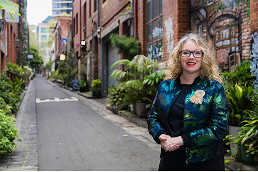History speaks again
Henry Reed is a relatively unknown Tasmanian who stood with John Batman on the banks of the Yarra River, right near Queens Bridge back in August 1835.
Batman famously said, “This is a place for a village”. Reed responded with a desire to help Batman build a new world – a world that was based on the values of the local Wurundjeri people such as, “No-one left behind”.
It was also a world, or at least a city, built on Reed’s own values of: No-one left behind; bring the outsider into the centre of the community and feel welcomed; challenge and change systems that produce victims.
Henry Reed’s life and especially his values and those of the local Wurundjeri people had such a profound impact on this fledgling city that I believe they helped shape and mould this city into the city that we know and love to this day.
In fact, during the 1890s, Reed’s values led to Melbourne becoming known globally as the world’s first social experiment. People travelled from across the world to view the city that demonstrated compassion to all, especially the most vulnerable. People were enthralled with the notion that a city was built on the value of no-one left behind.
Reed’s values also flowed into his family and shaped the way they lived their lives. Reed’s grandson, Hudson Fysh, was one of the founders of Qantas. Why? Fysh wanted to ensure that no-one was left behind. And what about Reed’s granddaughter, Sunday Reed? Sunday and her husband John founded the Heide Museum of Modern Art in Bulleen.
Reed’s values also impacted the work of the local Melbournians who were near contemporaries of Reed. Dr John Singleton, a medical doctor and philanthropist, was meeting with Rev. John Horsley, a Methodist Minister, in the City of Melbourne in 1869.
They were met by a delegation of concerned local citizens who organised significant concern about the number of Melbournians, particularly children, who were dying from preventable disease. Singleton and Horsley responded by building the world’s first free medical clinic.
It operated in Wellington St, Collingwood. In the 1870s and 1880s, Singleton and his wife, Isabella, made it a habit of waiting outside the Old Melbourne Gaol during the evening. This was the time that men would be released from prison. Dr John and Isabella would inquire if the recently released prisoners had somewhere to stay for the night. If the answer was no, the Singletons would invite the person back to their home.
The numbers that were being accommodated at the Singleton’s home were substantial. The fact that the Singletons also had 10 children made space to rest in the house difficult to find. In 1883, Dr John Singleton invited the newly arrived Salvation Army officers in Melbourne to join the Singletons outside the Old Melbourne Gaol.
Captains James and Alice Barker also made their home available to ex-prisoners. Dr John Singleton then purchased a house, which is still standing today in Argyle St South, Carlton. It became the first halfway house for prisoners anywhere in the world.
As I think about these stories and many others, I see the fingerprints (read values) of Henry Reed and the local Wurundjeri people, all over Melbourne’s history. In fact, I see their influence over the things that make Melbourne the great city that it is today. Our city’s compassion and care for the vulnerable person is well known. I believe that these values will continue to shape our city as we re-build out of the destabilisation that was caused by COVID-19.
It is interesting to not only reflect on the great work that occurred during the early days of our city. Much of that work was done to address emerging social issues in the City of Melbourne during the 1800s. Much of this work was undergirded and shaped by the values of Henry Reed and the local Wurundjeri people. It is also interesting to note that some of the social issues that were present in Melbourne during the 1800s is still being addressed today.
As I speak with Salvation Army prison chaplains, I hear ongoing reports that there are still some women and men being released from prison with very few, if any, options for support, including accommodation.
As a result, we are working with various partners to rebegin the old Prison Gate Brigade program that was launched by the Singletons and Barkers on December 8, 1883.
The new program will have a new moniker, “Progressively Getting Better”, but will retain the same abbreviation – PGB. Prison chaplains will assess people who are about to be released from prison. They will be looking for people who are absolutely committed to rebuilding their life, with the understanding that they won’t be doing this on their own.
The person will be provided with accommodation for 12 weeks. They will also receive an intensive case manager. They will also agree to participate in a program that will be designed to develop living skills, employability and to address the drivers for their offending.
With our partners, we hope to be able to provide longer term housing and employment options for everyone that completes the PGB program. Our plan is to launch the program on December 8, 2022 – 139 years since the program first began in Melbourne.
We believe that the PGB program will be yet another way in which the values of Reed and the local Wurundjeri people are embedded to ensure that Melbourne remains a city that is committed totally – that no-one is left behind. •

Could the Metro Tunnel help Melbourne rediscover its mojo?




 Download the Latest Edition
Download the Latest Edition